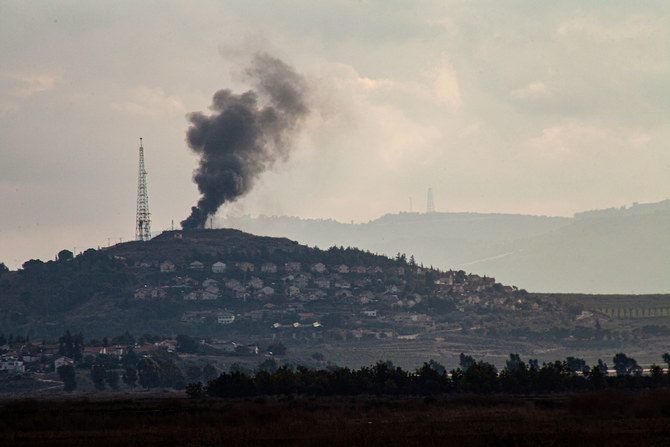BEIRUT: On Tuesday, the 80th day of the conflict in southern Lebanon, hostilities between Hezbollah and the Israeli army caused casualties among Lebanese civilians and the Israeli army, including serious injuries.
Israel also violated Beirut’s airspace. An Israeli drone targeted a spot close to a supermarket on the road leading to the center of Touline village. Two civilians were injured by flying glass from the attack.
Malek Awali, mayor of Touline, told Arab News that he was “surprised by this strike, as the village is 5 km north of the Litani Line, meaning that it is not located within the conflict area,” adding that “the bombed road doesn’t lead to the border region located south the line.”
Awali said that “Touline’s residents didn’t leave the village, which hosts 170 Syrian refugee families and 100 Lebanese families who fled the border region, considering it is a safe village.”
Before the attack on Touline, an Israeli drone carried out two strikes on an open area between the villages of Jibchit and Choukine. The explosions were heard in Nabatieh.
A security source told Arab News that “the Israeli bombing last week and early this week has targeted roads that lead to the border region and that are vital for Hezbollah, namely the Al-Khardali road.”
Following the death of the Iranian military commander Sayyed Reza Mousavi in an Israeli raid in Damascus, people in the southern region feared that Iran and its allies would respond to the incident from Lebanon.
Hezbollah announced that it had targeted several Israeli military outposts, causing direct casualties, including “the Zebdine outpost, using Burkan missiles,” adding that “Israeli enemy soldiers were deployed in the vicinity of the Ramyah outpost.”
The militant group added that it targeted “a monitoring room near the Shomera outpost using appropriate weapons, killing and injuring its members.”
Hezbollah also said that it targeted “a gathering of the enemy’s soldiers in the Dovev outpost using appropriate weapons, killing and injuring them.”
Israeli media said that “an Israeli soldier died due to injuries he received from an anti-tank missile fired from Lebanon last week.”
The Israeli army conducted military actions in southern Lebanon, using airstrikes, artillery shelling and phosphorus bombs.
The attacks were directed at the outskirts of Blida, Mays Al-Jabal, Jabal Balat, Marwahin, and the eastern outskirts of Naqoura.
The Israeli bombing targeted the vicinity of the Zabdin farm in the Shebaa Farms, and the Israeli army carried out two air strikes with missiles, targeting agricultural lands in the town of Mays Al-Jabal in the eastern sector. The Israeli artillery shelling also targeted the outskirts of the town of Rashaya Al-Fakhar.
In the morning, the Israeli army fired toward the valleys and outskirts adjacent to the towns of Aita Al-Shaab, Ramiya, Tallet Al-Mutran, the Hamams area in Sarda, Wata Al-Khyiam, the outskirts of the town of Beit Lev, the outskirts of the town of Aitaroun, and the Al-Tarash area in the town of Mays Al-Jabal. The phosphoric artillery bombardment targeted the Balat Heights.
During the Christmas holidays, MP Melhem Khalaf, from the Forces of Change, toured the southern border villages of Hasbaya, Al-Kfir, Al-Qulayaa, Deir Mimas, Rmeish, Ain Ebel and Bint Jbeil.
He said on Tuesday: “There are 44 border villages experiencing war. There are victims and martyrs, shops are closed, daily life is disrupted, and anxiety, fear and destruction are spread. All the people of these villages are paying the price on our behalf and they are asking: Where do you stand concerning our concerns?”
Hezbollah politicians replied to calls to spare Lebanon from further involvement in the Gaza war. Hezbollah MP Hussein Jashi referred to what he considered “the plea of Western delegations not to expand the confrontation front in Lebanon.”
He said: “We are not concerned with reassuring the enemy and its settlers. Rather, we are present in our land and ready to respond to any attack decisively and without delay.”
Former Hezbollah Minister Mohammed Fneish said: “No one can discourage us from performing our role. Whoever wants to bury his head in the sand should do so, and refrain from bearing responsibility. We are not immune from the repercussions of the conflict and we will not fall into the traps of promises or temptations.”


























